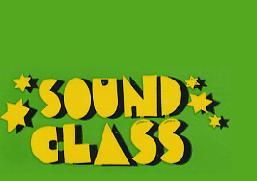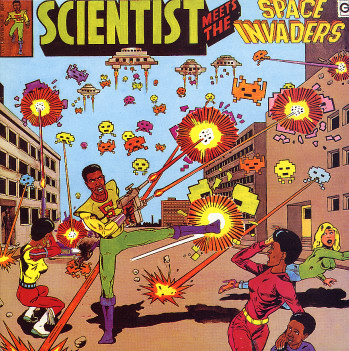welcome back

(a rare sight: royalty ready for war)
google is a strange beast. when i posted a student's reaction to damian marley a month or so ago, i had no idea that i would suddenly be getting upwards of fifty hits per day on account of it. [note: in the day since i started composing this blog, the post in question slipped from the 1st to the 8th page of returns, only further confirming the strangeness of google, and perhaps making this follow-up a little late.] i've been meaning to compose a more proper post on "jamrock" since then, as my student's email is a pretty scathing indictment. considering the number of hits the diss was getting, i thought that perhaps i should provide a more balanced perspective. can't give jr. a straight gong now, can we?
no, we can't. especially when, when it comes down to sonic force, welcome to jamrock is an undeniable hit. an almost perfect product: neo-retro riddim, haunting ini kamoze sample, dubby production (though largely via samples), sirens, unrelenting 'reality' lyrics, wicked flow, bad voice (and not bad meaning bad), rastafarian righteousness--and to top it all off, a video filled with the arresting images of sufferahs' jamaica. (big up, ras kassa.)
at the same time, when we get over the exhilaration of the musical experience (or, more likely, drift through associative frames while listening), we're faced with a bunch of negative cliches in sensuous form. marley breaks no new ground here. the content differs little from, say, that of the poor people's governor. DJs and singers have been describing the harsh realities and celebrating the strengths of jamaica since before it was called reggae. sure, marley's doing it differently, and even 'originally' at times (speaking in terms of style, not substance), but hardly. what distinguishes him at this moment is a glossy production, a strong performance, and good promotion.
part of the problem is that, unfortunately, ultimately he's a marley. not that that's a bad thing in itself. not at all. but his reception is impossible to extricate from bob's legacy, which both helps and hinders him. it helps him in the international market, and it helps him in terms of access to resources. it hinders him, however, given the tendency everywhere to suspect (even as we imagine) that talent truly is transmitted through our genes, and the tendency in jamaica to suspect that brownings are full of shit when they critique the very system from which they benefit. (which is one reason that bob fell out of favor in jamaican dancehalls well before his death.)
there's no denying that a tenacious correlation between wealth and color continues to divide and plague jamaica. this is what my student was getting at (or what was getting at her) when she suddenly became incensed by what she saw as an uncritical reception of damian marley. in certain ways, i would agree that her critique goes a bit too far, and she admitted herself that it was written in something of a cathartic state. i thought it worthy of "publication," though, precisely because of the emotion it expressed. clearly there's a lot of ambivalence in her position as a member of the jamaican elite (whether she likes it or not, going to brown places her there), and this comes across in what amounts to a fierce critique of her peer group. for her, and for me, and i suspect for many others, "jamrock" comes a little too close to romanticization. i mean, sure, the thugs dem do what they got to, but damn, a lot of people get caught in the crosshairs.
can't knock the hustle, though, right? only where's the line between faithfully reminding the world that people are forced to do-what-they-gotta-do to survive and glorifying what too often slides quickly into rapacious behavior? are the youths to be fed, clothed, and encouraged? or are they to be paraded on video and billboards, selling an image of jamaica that is not really so easily divorced from its attraction as a tourist destination or a media production center? let's not forget that jamaica is a place that explicitly markets and sells its image in various forms. for better and worse. simulation for too many. reality for too many, too.
considering that the same social problems that bob was chanting down remain a trenchant subject of rasta's/reggae's social conscience, it seems troubling that the status quo not only obtains but that the sheen of rebel music now glows so gleamingly from within the establishment. does damian's dedication to the poor--if that's what we hear in this song--make up for the level of privilege that he has enjoyed and continues to enjoy? does it get us any closer to dismantling the system that creates and maintains such insidious hierarchies and inequalities?
another thing that my student, and other critics, react to is the whiff of hubris that comes off the marley boys. most of bob's devotees worldwide are more than ready to hear echoes of the legend and to see his legacy continue in such ready vessels as his spit-and-image-and-dreads children. (those who claim, however, to like "jamrock" more than anything bob ever recorded need not go to hell, but definitely must listen to more than that legend comp.) to be fair, the marley boys are in something of a spot: lacking the life experience that so fueled bob's fire, they are caught chanting down a system from which they now benefit. and i'm not sure that the pragmatic angle represents the most visionary position. perhaps worse than their inescapable, quasi-bourgeois subject position (the ol' authenticity of positionality at work), they're also saddled by the air of divinity that continues to accrue around their father's music and myth. the best (and by best i mean worst) example of the marley-hubris that i witnessed recently was in the video for julian marley's "harder days." there's a scene in which julian stops at a red light, is approached by a red-and-green-bedecked youth in a wheelchair, and cures the young cripple with a mere touch of the hand (see 2:40 to 3:00). jeeeeez-us!
and still, despite these cringe-worthy moments and the overall pap-factor of "harder days," it's a pretty catchy tune. gets stuck in my head frequently, truth be told. and "welcome to jamrock," for all its similarities, is even better. if for no other reason than that it means a lot to a lot of people in jamaica (and beyond) for reggae music to spread and succeed, i have to give the tune my blessing. since it's such a hard tune, that won't be too difficult. trust me, i'll be juggling it alongside the kamoze original, the biggie mashup, and all the good versions that are undoubtedly to follow.
all in all, i have to give the song a forward. but it's important to me to register my ambivalence, too. all of this enters into the experience of hearing and responding to the song. when i weigh my feelings at the end of the final echo, i feel good about it. i feel traction in the right direction, even if it's relative (and even if it's according to the narrative in my own head--but what else would it be?). thinking critically about reggae (and not critically meaning negatively), it's reggae's insistence on forward movement that gives it so much of its appeal, such power, such resonance. hence, it is when reggae appears to be looking backward that i--as a sympathetic, invested, and passionate participant/observer--grow disappointed. reggae so often is insistently progressive. militant in its optimism, its determination, its one-way telos: forward ever, onward, don't stop. yet i fear that reggae's handful of regressive tendencies--most of which consist of reproducing the very oppression that it so compellingly chants down--are holding it back, and many of us with it. cliches tend to keep us in the same place. they are, by definition, the same ol' same ol'. what's more, positive cliches can be as bad as negative ones when they encourage kneejerk support of unexamined positions. better to present people with new and challenging perspectives in order to help them to see the world more clearly, to see through myth and ideology and prejudice. reggae has done this for a long time, sometimes, despite the paradox of it all, through a stance of utter righteousness. (it was and is, after all, opposing a corrupt system and unjust status quo.) but again, we can observe a fine line between righteousness and self-righteousness. and who's to decide really? unless we keep the consensus about what-to-be-righteous-about pretty broad, we risk perpetuating structures of domination.
i talk about 'it' and say 'reggae' here--and not 'reggae-artists' or 'DJs' or 'Jamaicans'--because reggae is at this point a force unto itself, a thing bigger than any individual artists (or storytellers). it is a force comprised of the cumulative energy released by jamaican-shaped vibrations--vibrations that have carried jamaica's unique and inspiring story of itself and its struggles, its inventions and achievements, to the world. the narrative is always in formation, of course, revised and appended by DJs and singers, critics and audiences, academics and entrepreneurs--but the weight of history proves a solid foundation. i'm not here to tell anyone else about what reggae means, though. i'm here to tell you what it means to me. and i suspect, and hope, that some might find my impressions resonant and my arguments compelling. so mek we reason, since, thankfully, rastafarians have rescued the value of a good argument from the fatally-flawed enlightenment project. "welcome to jamrock" is, if nothing else, a conversation-starter, and that's a sign of value, fi true.





























